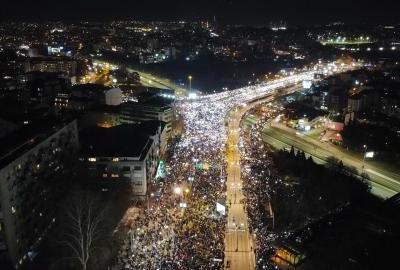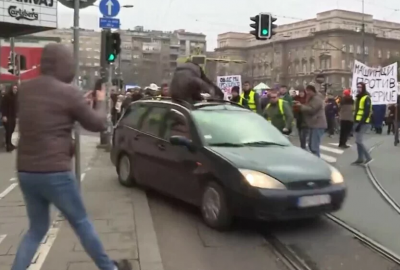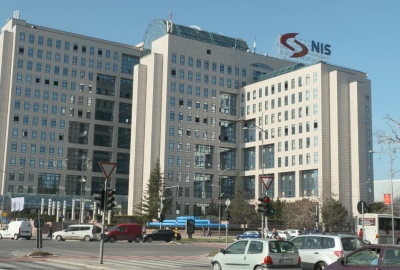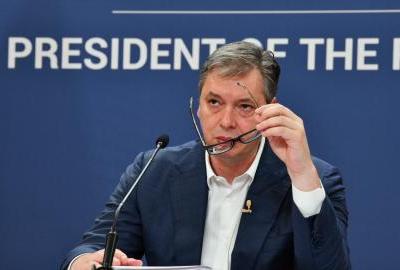Žurnal in English
NATIONALIST FANTASY AND MISERABLE REALITY: Starving under the Serbian flag
It is needless to emphasize that all the representatives of the Kosovo Covenant and Heavenly Serbia live at the expense of the citizens, and very comfortably at that, so their rapture is firmly based in the worldly empire. A giant pyramid of corruption, privileges and general looting of one's own country rests on mythological nationalist stories. It is understandable that members of the privileged elite persist in making a fog out of Kosovo peonies, the Serbian cross, false patriotism and imperial aspirations.

The European Bureau of Statistics published data for last year, which say that Serbia was the fourth poorest country in Europe in 2021. Only the neighbours from the emerging Open Balkans are poorer than Serbia: North Macedonia, Albania and Bosnia and Herzegovina. So how is it now? President Aleksandar Vučić and his well-paid minions have been proclaiming for years that we are living in a golden age, that investors are rushing to invest in our country, that we have never been better off, that Serbia has become an economic tiger under the progressives, but it turned out that reality doesn’t have understanding for progressive optimism. In general, too little is said in the domestic brainwashing media about the anti-Vuvučić and anti-Serb character of the facts that conspired against our people.
The stated information is nothing new, because the citizens of Serbia have been living in poverty for decades, since the moment when the awakening of the people, the restoration of national pride, the rehabilitation of the Kosovo covenant, the determination for a heavenly Serbia, and another round of the eternal struggle for the liberation and unification of all Serbs began. In that tumultuous time of heated national romanticism, the awakened people despised the calculating logic of Ante Marković, who brought a better life and promised even greater prosperity, and gave their enthusiastic trust to exaggerated demagogues who promised the population that they would start new battles and eat roots.
Liberation and unification of all Serbian countries
As you can see, little has changed in the last three and a half decades. The latest data show that half a million people in Serbia are absolutely poor, without basic means of living, while around two million people are at risk of poverty. Did it upset someone and move them to action? Did the alarm go off with the representatives of the authorities? Of course not, the ruling caste suffers from all the wounds of its kind, except social ones, they don't pay too much attention to these trifles. And right now they are busy with more important tasks: the defence of kidnapped Kosovo, the joining of Montenegro to the Serbian world, and the preservation of Republika Srpska as the main spoils of war. In short, the same work that the Serbian nobility has been doing for the last two hundred years: the liberation and unification of all Serbian lands.
After all, why should they deal with the seemingly urgent issues of combating poverty and improving the living conditions of their own citizens? If there hadn't been some social rebellion? Are there any mass demonstrations where the authorities would be asked to distribute the budget more fairly, protect workers' rights, demonopolize the market, release the state from the partocratic embrace, free competition, and European integrations, which are the only way towards improvement? Of course, there are no such blasphemous phenomena in our society. And since there is no pressure from below, those from above have no reason to deal with such crazy things, in addition to the huge unresolved national issues.
The tradition of “Javašluk”, partocracy and nepotism
There were a couple of attempts by the opposition to direct the budget towards solving social problems, but the ruling coalition flatly rejected all their amendments. There is no money for sewerage, for the introduction of drinking water, for the treatment of sick children, for the construction of student dormitories, or for greater investments in communal infrastructure, health and education. But that's why there is plenty of money for the police, army and security services, the Kerberos of order must be satisfied. There is also money for the construction of the national football stadium, as much as 900 million euros. For that sum, 6,000 kindergartens or 2,000 health centres could be built, but the people of heaven should not engage in such mundane, worldly trifles, but rather cheer for the national team and thus satisfy their spiritual needs.
There was also money for many more senseless projects, for example, the appointment of the owner of the bakery Milorad Grčić to the position of director of Elektroprivreda Srbija cost us at least one billion euros, if not more, but it is a small price to pay for maintaining the Serbian tradition of “javašluk”, partocracy and nepotism. If we appointed professional people to responsible positions, and not proven patriots from the ruling party, decent and obedient ignoramuses, we would betray all the vows of our ancestors, we would begin to resemble the godless West and in the end, we would be left without a national identity. We must not allow them to tear us apart, even if it costs us like scrambled eggs cost St. Peter.
Holy Russian land
It is not only the rulers who are busy fighting for the barricades in the north of Kosovo, they are also being helped by the "Night Wolves", a Russian biker club for the spread of Putinism, of which Vladimir Vladimirovich Putin himself is a member. They were banned from entering many European countries even before the war in Ukraine, but they are more than welcome in the cradle of Serbia, just like the powerful symbols of the Wagner group, just like the flags with the words "Trust in God and stick to Russia". It seems that in the meantime there has been a slight change of plan, so Kosovo will become a sacred Russian land, in case Putin somehow overcomes the decadent West and introduces a new world order. And it is also possible that all of Serbia will have a similar status.
In addition to the Russian extremists and the ruling Serbian caste, there is also a large part of the opposition, always on the defensive of the motherland and the national program that dictates the territorial expansion of the always too-small Serbia. National unity makes the opposition a bit redundant, but they don't think that they will change anything seriously anyway, their ambitions are quite far-fetched, and the ideology that has kept us in poverty and backwardness for a couple of centuries to remain unchanged. This is completely logical and pragmatic, in a more orderly country and with more decent social conditions, gentlemen from the government and the opposition would not occupy important positions, because there would be someone who deserves it with his abilities, intelligence and work.
Starving under the Serbian flag
In addition to the listed categories, the majority of the hypnotized population also deals with national issues, while their vests are bursting for their own social problems. It is important that the Serbs agree, multiply and become poorer, that the Serbian lands are united, and how its inhabitants will live in that imagined greater Serbia is less important, these are banal questions unworthy of the oldest nation. Whenever some on-duty traitor raises the issue of quality of life, standards, economy, salary and pensions, economic development - immediately a flock of budget patriots snaps at him that it's all irrelevant, that it's a shame to even think about it while Kosovo is being taken from us and Hilandar is burning. Or they simply tell him that it is enough to reduce Serbia to the rank of a prostitute, as Miloš Jovanović, the president of the New DSS, did recently when he was asked how much it would cost the citizens to abandon the European path.
It is needless to emphasize that all the representatives of the Kosovo Covenant and Heavenly Serbia live at the expense of the citizens, and very comfortably at that, so their rapture is firmly based in the worldly empire. A giant pyramid of corruption, privileges and general looting of one's own country rests on mythological nationalist stories. It is understandable that members of the privileged elite persist in making a fog out of Kosovo peonies, the Serbian cross, false patriotism and imperial aspirations. It is less understandable why those stories have been bought for a couple of centuries by those who always get the better end, are robbed or turned into cannon fodder in wars from which only members of the elite, war profiteers, politically powerful and their intellectual servants benefit.
Considering the general poverty and backwardness, it would be logical to expect that the unofficial anthem of the Serbian people is something along the lines of "Get up, you slaves of the earth, you slaves who die of hunger" or at least "Down with force and injustice", but this is not the case. Songs with such class and social themes do not enjoy popularity among the general public. In recent years, the song "Veseli se srpski rode" has the status of an unofficial Serbian anthem, which speaks precisely about the unification of the Serbian countries embodied in the cry: "Let the Serbian flag be flown from Prizren to Rumija". Let half a million people be on the brink of starvation under that banner, and two million on the brink of poverty, that's all onions and water, trifles, the only thing that matters is that the country is bigger than it was.
Next year in democracy
What would the forgotten left-wing thinkers say, the oppressed class has accepted the image of the world imposed on it by the oppressor. This has some justification when it lasts, say, two decades or half a century at the most, but if the same story is repeated for two centuries, then the oppressed also have some serious problems. When the First Serbian Uprising began 218 years ago and the fight for liberation from the foreign yoke began, the fiddler sang about the poor paradise that cannot even tolerate Turkish oppression even if it gives a fine.
It quickly became clear that the poor of Paradise can pay a much larger fine, that they have no problem with suffering Serbian oppression, and that the concept of freedom is somewhat reduced in our country. Namely, freedom means only the state when we are not under a foreign occupier, while we perceive slavery to domestic tyrants and autocrats as a patriotic obligation. Such a state will prevail as long as the imperial national program is accepted as something inevitable, as a false salvation from necessary changes, both for oneself and for the entire society. And that according to that disgusting western democratic model, because there is no other.
The inevitable processes have been postponed for a couple of centuries, but it is all in vain, one day we will have to deal with real problems, not just nationalist fantasies. As long as our national slogan is "Next year in Prizren", there is little hope for such a turnaround. When it is replaced by something more down-to-earth, human and realistic, it will be a sign of deep change. For example: Next year in the consumer basket. Or: Next year in democracy.
(zurnal.info)








